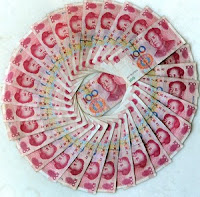In November President Obama said, "enough is enough" to China's currency manipulations. Today the Treasury Department said it hasn't seen enough to call China a currency manipulator. This is happening because certain powerful interests are benefiting tremendously and using their wealth and power to keep things from changing.
China's Currency Manipulation
China manipulates its currency to keep it "undervalued." This means that things made there cost less in world markets than things made in other countries. The result is that manufacturing moves there, bringing them entire industries, supply chains, and the "industrial commons" of expertise, suppliers and culture that brings with it new businesses and industries. Many economists say that China's currency is undervalued by 25 to 40% meaning products made there have a 25-40% pricing advantage before any other advantages, subsidies, manipulations, etc. are considered. The currency it does not rise to market levels because China takes steps like preventing open trading and buying other currencies -- most of us wold call this manipulation -- to keep this from happening.
Instead of competing fairly China uses this manipulation and others, throwing world trade completely out of balance. Countries "make their living" by producing things and selling them to the rest of the world. This imbalance is costing our country jobs, factories, industries and trillions of dollars but we can't seem to get our government to do anything about it.
"Enough Is Enough"
In a November 14 press conference at the Asia Pacific Economic Cooperation (Apec) summit in Hawaii, President Obama acknowledged the simple reality that China is not allowing its currency to rise to market levels and that this is distorting global trade. He said “enough’s enough.”
“Changes are difficult for them politically, I get it…But the United States and other countries, I think understandably, feel that enough’s enough.”But Not Enough
And in regards to to the glacial pace at which China has been raising the value of the yuan, the president pointed out that “We recognize they may not be able to do it overnight…but they can do it much more quickly than they’ve done it so far.”
The US Treasury Department today released its semi-annual Report to Congress on International Economic and Exchange Rate Policies. From the report's Key Findings:
"This Report highlights the need for greater exchange rate flexibility in these economies and most notably in China.This is the sixth time the Obama administration has refused to label China a currency manipulator and begin taking steps to remedy this problem that is distorting world markets and taking our jobs, factories, industries and money.
Over the past decade, China has resisted very strong market pressures for RMB appreciation. China’s real effective exchange rate has exhibited persistent and substantial undervaluation, although the estimated range of misalignment has narrowed over the course of the past 18 months."
Currency Legislation
In October the Senate passed a bipartisan bill -- on a vote of 65 to 35 -- a bill requiring the administration to label China a currency manipulator and begin the necessary steps to remedy the problem. The House Republican leadership has refused to allow this to come up for a vote - because it will pass.
House Speaker John Boehner has made it clear he wants nothing to do with the legislation that has already raised heckles in Beijing.Even though many Republican members of the House say they support the bill, none of them will sign a discharge petition to force Speaker Boehner to allow a vote. Wall Street opposes addressing the currency imbalances, and has made it clear through their front-group Club For Growth that Wall Street will oppose House members who help bring this up for a vote. And right now Wall Street has more influence in DC's ongoing influence scheme than those who want to manufacture in the US, thereby bringing jobs, factories, industries, innovation and money back to the US.
And for now he seems to be in control despite loud protests including from within his own party.
Boehner, the most powerful Republican in Congress, denounced the bill again on Wednesday, a day after it passed the Senate, saying it posed a "very severe risk" of starting a trade war between the world's two biggest economies.







0 comments :
Post a Comment